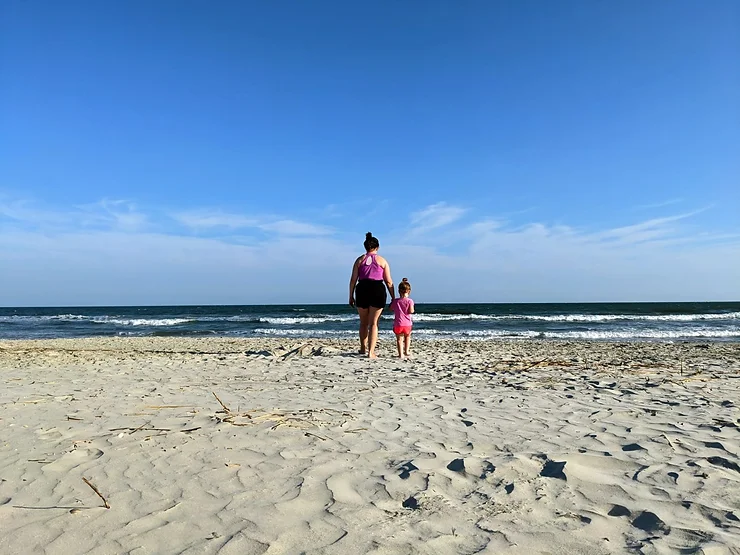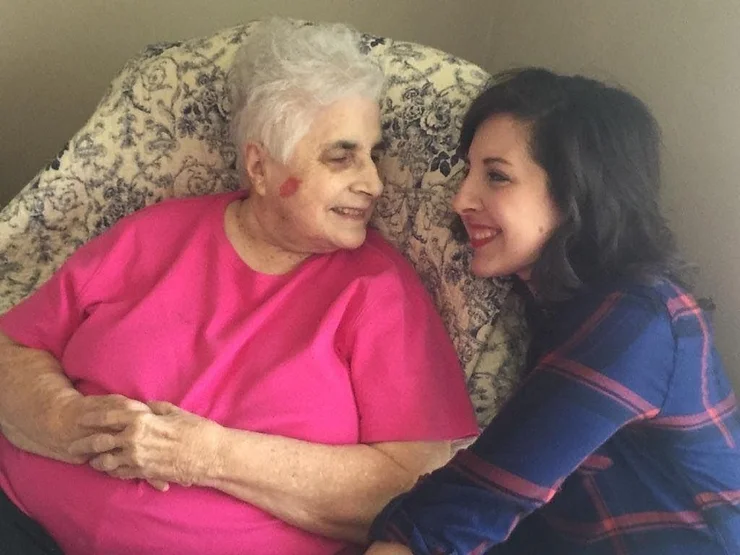Jesus’ Humanity, Our Comfort
If you were to ask me, “Kristina, what is one area of care that you wish everyone were more familiar with?” I would say: Grief. For two main reasons. 1)Being emotionally aware of the five stages associated with grief are helpful for providing care to others, and 2) Jesus experienced grief so much to the degree he is known as “man of sorrows.”
I’m not an expert; I’m just someone who is interested in learning ways to encourage and support others. In most of my interactions, I can’t help but notice the ways in which so many of us grieve. By identifying the areas of grief in myself and others, I find it easier to provide love and care, meeting people where they are.

Let’s start Here: What is Grief, anyway?
A loose definition of grief is the deep sadness we feel when we lose something or someone significant. The “Five Stages of Grief” are a well-known framework that describes five common emotional responses to loss. These stages—denial, anger, bargaining, depression, and acceptance—may not unfold in a fixed sequence, and not everyone experiences all of them. Grief is deeply personal. Understanding grief can be challenging and impossible to do on our own. With time, most of us find a way to cope and heal.
How does it feel?
While I cannot answer this for you or everyone, but for me, the deep sadness associated with grief can be as unpredictable as the weather. I live in the Charleston, SC area, where we get pop-up showers that are hardly ever predicted by the weatherperson. We could be having the most beautiful, sunny day when all of a sudden, a dark cloud rolls in, and the sky opens up with giant raindrops. It could pound rain and then stop within minutes, sometimes causing flooding – especially in the downtown area, but sometimes the clouds and the rain linger, and it rains all through the evening.
If peace comes like a calm river, grief can hit like a sudden storm.
It’s not only during tough seasons, special dates, or at specific places that remind us of loss – all of which are good indicators of tough days. Sometimes the toughest days are those days when the weather is sunny then grief rolls as fast as dark clouds on a summer sunshiny day.
I have suffered the loss of many dear loved ones over the years. I know that grief well. The deep love associated with the emotions of loss that I feel reminiscing on the memories and wishing they could be with me today, running all the “what-if’s” through my mind and the exhaustion that comes with switching between denial and acceptance associate with grief can be totally debilitating at times.
I have also suffered the loss of many dear-to-me somethings in life and have had the honor of supporting others as they learn to live with the loss of somethings as well. Honestly, I have lost more somethings than someone’s. Our culture often places losses in a hierarchy, some losses are greater for some people more than others. But at the end of the day a loss is a loss and hurts, hurts. Something’s losses may be missed opportunity, job, estranged family, growing out of friendships, mental illnesses, loss of trust, living with learning disabilities, a flat tire on your way home from work during rush hour, or getting your first gray hairs (in true denial of grief, I’m going to go ahead and say I put that last one in “for a friend”)
Contrary to the prevalent notion of self-sufficiency, we, as humans, are designed to be interdependent. Acknowledging our neediness is not a weakness; it’s an essential part of our humanity. We were made for the community. I have experienced and seen how suppressing feelings an all-too common tactic of pride.
Who wants to appear soft, sensitive, or needy anyways?
On the flips-side, who wants to be known for embracing a prideful lifestyle?
Let me take a minute here, I am not saying that we should let our emotions rule our lives. But rather, we should acknowledge our emotions as indicators of what is going on in our heart. Emotions can reveal the deep love and gratitude we have, hurts, and they can also reveal idols in our lives that we must learn to recognized and surrender to Jesus. That’s not something that should be done alone. We need each other.
Is it more Christ-like to be needy or self-sufficient?
I see in scripture that we are needy by design. I know that sounds countercultural to most of today’s standards as we too often hear messages like, “You can do it on your own” or “It’s all for you,” but I don’t see that in the life of Jesus. We are needy by design – all of us. Whether you know Jesus or not. We need God and we need each other.
We grieve when life unfolds in ways, we neither want nor expect, and it’s essential to be there for each other as we navigate life and loss together.
We are not naturally inclined to ask for help or let others know we are suffering – no matter how big or small. It can be so ways to believe someone “has it worse” or that we don’t need help or support but in reality, we are needy people who need each other and we need to check on each other often.
If we are looking at others from the outside in, we will miss plenty of opportunities to care for each other. If you’re on the outside and you think of someone, go knock on their door, send them a text, a card, flowers, something. Just let them know that you are there to sit with them and listen.
If you are the one in the house and you are suffering, grieving, it’s your responsibility to open the windows, unlock the door and invite someone in. That’s what Jesus did. I know that this is not easy and that emotions can be entirely controlling but the only way out is to let someone know and invite them into what’s going on. I’m a huge advocate for counseling by a professional and an even great advocate for community with a local church. If you’re in a pit, don’t wait, get help.
What’s wrong with acknowledging our neediness?
Jesus invited others in, so should we. In Matthew 26:36-46, we witness Jesus’s profound grief and sorrow. He was deeply grieved, to the point of feeling like he was going to die. Jesus, in his humanity, knew sorrow, and he sought solace and help from God the Father. Importantly, he did not face this alone; he invited his friends, his disciples to share in his sorrow.
“Then Jesus went with them to the olive grove called Gethsemane, and he said, “Sit here while I go over there to pray.” Then he came to the disciples and said, “Go ahead and sleep. Have your rest. But look—the time has come. The Son of Man is betrayed into the hands of sinners. Up, let’s be going. Look, my betrayer is here!” So he went to pray a third time, saying the same things again. When he returned to them again, he found them sleeping, for they couldn’t keep their eyes open. Then Jesus left them a second time and prayed, “My Father! If this cup cannot be taken away unless I drink it, your will be done.” Keep watch and pray, so that you will not give in to temptation. For the spirit is willing, but the body is weak!” Then he returned to the disciples and found them asleep. He said to Peter, “Couldn’t you watch with me even one hour? He went on a little farther and bowed with his face to the ground, praying, “My Father! If it is possible, let this cup of suffering be taken away from me. Yet I want your will to be done, not mine.” He told them, “My soul is crushed with grief to the point of death. Stay here and keep watch with me.” He took Peter and Zebedee’s two sons, James and John, and he became anguished and distressed.” Matthew 26:36-46 (NLT)
Jesus was deeply grieved, to the point where His soul was overwhelmed with sorrow, even to the extent that He felt like He was going to die. Jesus in His humanity was not well.
Let’s soak that in for a minute.:
Here is Jesus, the Son of God, Savior of the world and He knows what sorrow feels like. He knows what anticipating a difficult situation feels like. He knows the impending anguish of pain, suffering, and loss. He left Heaven to experience this. Jesus knows grief and sorrow.
I feel closer to Jesus knowing that he knows what it’s like to have that eerie, unwell, heart-falling pain, pit in your stomach, sleepless night, nowhere-to-go but to God the Father for solace and help. Jesus knows and exemplifies that our help comes from the Lord (see Psalm 121:1) and Jesus
did not go to God the Father alone.
This is an incredibly important and often missed aspect of following Jesus: Jesus asked His closest friends to be with Him during the most difficult season of His time on Earth. Exemplifying the human need for all the one another’s of scripture in his human need.
Did you notice that Jesus openly expressed His emotions to his friends, saying, “I am deeply grieved” (v. 38)? He was vocal about his pain. I appreciate how The Message translation puts it, “the sorrow is crushing my life out.” Can you imagine? Jesus, the Son of God, the Savior of the World is overwhelmed with cruising grief and He told people about it?
Not only did Jesus tell Peter, James, and John how he felt, but did you notice that Jesus asked them to remain awake with Him?
Jesus, the Son of God, Savior of the world requests the company of His fully human and imperfect friends.
I know many fully human and imperfect friends, and I count myself among them.
If Jesus, who is both fully God and fully human, invited His friends to be with Him during a time of profound grief, shouldn’t I do the same in my moments of sorrow?
I am so broken about how often I, in my own pride, neglect asking for help from others. It is not easy for me. I try ti do it because I need it. I need my imperfect friends to speak life to my grief and sit with me as I do the same for them. I am grateful that we have much to offer one another because we are loved by a perfect God.
Jesus spent time with those whom He knew would betray them. Who does that?
Jesus, had dinner with at the twelve disciples including Judas before Judas betrayed Him. Jesus even excused Judas from the table so he could leave dinner to specifically betray Jesus. Jesus loved Judas still knowing that a kiss on the cheek would lead to ultimate betrayal of a friend.
Jesus knew that Peter was going to lose his temper, cut off that soldier’s ear and deny ever knowing him three times in one day… before dawn actually. Jesus knew that and He still invited Peter to pray alongside him in Gethsemane.
How humble is our God?!
I am grateful that we have Jesus as our high priest who understands our weaknesses because he faced the same testing’s that we do (see Hebrews 4:15).
Isaiah 53 describes Jesus as “despised and rejected by men, a man of sorrows and acquainted with grief” (Isiah 53:3, CSB) And while Jesus did this without sinning, He invites us to come “boldly to the throne of our gracious God. There we will receive His mercy and we will find grace to help us when we need it most” (Hebrews 4:16, CSB).
In Matthew 26, did you notice that Jesus left His conversation with God three times to check in with his disciples? Urging them to pray so they would not fall. What I find most inspiring is that Jesus continued to disciple Peter, James, and John through His grief and suffering.
Jesus was just as concerned with His disciples praying as He was with His own communion with God. Can you imagine? The Son of God, the Savior of the World, fully aware of the immense task before Him, feeling sorrow and grief, and yet Jesus remained on mission, showing His disciples that “fishing for men” means inviting them onto the boat in the storm with them.
Jesus knew what to do, he was focused on the goal and did what was holy and necessary to get there. God did not take the cup from Jesus. Jesus surrendered to the redeeming plan to rescue us from separation from God and gave His life, His death, and His resurrection all for love and it was not without grief.
Whether you’re experiencing the loss of loved ones or shattered expectations, grief hurts. It takes time to process, and it requires grace, wise counsel, friendship and a relationship with God through Jesus, our Living Hope.
Where do we grow from here?
-Read Isaiah 53 and Matthew 26:36-46. What do these passages tell us about Jesus’ character (his heart)?
– How can you give yourself and others the grace and space to grieve not only for the “someones” we have lost but also for the “somethings” that we have lost as well?
– How can you lead by example, demonstrating honest vulnerability to encourage others to recognize the same within themselves?
Song Recommendation: Man of Sorrows by Hillsong Worship. “Man of sorrows, Lamb of God, by his own betrayed…” As I have been reflecting on this post, I have had that song stuck in my head and the lyrics hit so differently as I take time to meditate on the Bible passages I’ve shared. Sometimes, in sadness, it can be challenging to worship. We can sing about God’s goodness, but his goodness towards us comes through the redeeming work of Jesus on the cross for our sins which came from great sacrifice, loss, sorrow, grief, all rooted in an even greater love.








